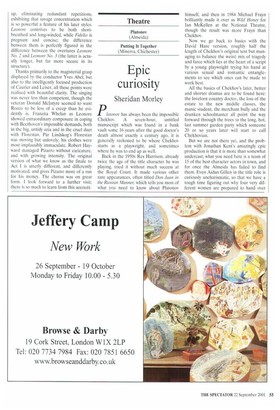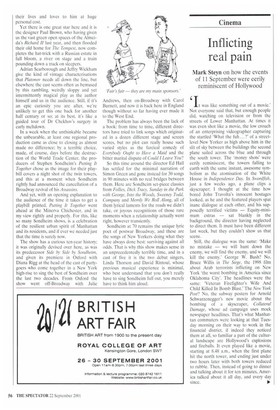Theatre
Platonov (Almeida) Putting It Together (Minerva, Chichester)
Epic curiosity
Sheridan Morley
Platonov has always been the impossible Chekhov. A seven-hour, untitled manuscript which was found in a bank vault some 16 years after the good doctor's death almost exactly a century ago, it is generally reckoned to be where Chekhov starts as a playwright, and sometimes where he was to end up as well.
Back in the 1950s Rex Harrison, already twice the age of the title character he was playing, tried it without much success at the Royal Court. It made various other rare appearances, often titled Don Juan in the Russian Manner, which tells you most of what you need to know about Platonov himself, and then in 1984 Michael Frayn brilliantly made it over as Wild Honey for Ian McKellen at the National Theatre, though the result was more Frayn than Chekhov.
Now we go back to basics with the David Hare version, roughly half the length of Chekhov's original text but managing to balance the weird mix of tragedy and farce which lies at the heart of a script by a young playwright trying his hand at various sexual and romantic entanglements to see which ones can be made to work best.
All the basics of Chekhov's later, better and shorter dramas are to be found here: the lovelorn country doctor, the loss of the estate to the new middle classes, the manic student, the merchant bully and the drunken schoolmaster all point the way forward through the trees to the long, hot, last summer garden party which someone 20 or so years later will start to call Chekhovian.
But we are not there yet, and the problem with Jonathan Kent's amazingly epic production is that it is more than somewhat undercast; what you need here is a team of 15 of the best character actors in town, and for once the Almeida has failed to find them. Even Aidan Gillen in the title role is curiously uncharismatic, so that we have a tough time figuring out why four very different women are prepared to hand over their lives and loves to him at huge personal cost.
Yet there is one great star here and it is the designer Paul Brown, who having given us the vast green open spaces of the Alrneida's Richard II last year, and then flooded their old home for The Tempest, now completes the hat-trick with a Russian estate in full bloom, a river on stage and a train pounding down a track on sleepers.
Adrian Scarborough and Jeffry Wickham give the kind of vintage characterisations that Platonov needs all down the line, but elsewhere the cast seems often as bemused by this rambling, weirdly sloppy and yet intermittently magical play as the author himself and us in the audience. Still, if it's an epic curiosity you are after, we're unlikely to get this one back for another half century or so; at its best, it's like a guided tour of Dr Chekhov's surgery in early meltdown.
In a week when the unthinkable became the unbearable, at least one regional production came as close to closing as almost made no difference; by a terrible choice, made, of course, days before the destruction of the World Trade Center, the producers of Stephen Sondheim's Putting It Together chose as the image for their playbill covers a night shot of the twin towers, and this at a moment when Sondheim rightly had announced the cancellation of a Broadway revival of his Assassins.
And yet, with an opening explanation to the audience of the time it takes to get a playbill printed, Putting It Together went ahead at the Minerva Chichester, and in my view rightly and properly. For this, like so many Sondheim shows, is a celebration of the resilient urban spirit of Manhattan and its residents, and if ever we needed just that the time is surely now.
The show has a curious ten-year history; it was originally devised over here, as was its predecessor Side by Side by Sondheim, and given its premiere in Oxford with Diana Rigg at the head of the cast of partygoers who come together in a New York high-rise to sing the best of Sondheim over the last two decades. From Oxford the show went off-Broadway with Julie Andrews, then on-Broadway with Carol Burnett, and now it is back here in England though without so far having ever made it to the West End.
The problem has always been the lack of a book: from time to time, different directors have tried to link songs which originated in a dozen different stage and screen scores, but no plot can really house such varied styles as the farcical comedy of Everybody Ought to Have a Maid and the bitter marital dispute of Could I Leave You?
So this time around the director Ed Hall has settled for the minimal narration of Simon Green and gone instead for 30 songs in 90 minutes with no real bridges between them. Here are Sondheim set-piece classics from Follies, Dick Tracy, Sunday in the Park with George, Into the Woods, Sweeney Todd, Company and Merrily We Roll Along, all of them lyrical laments for the roads we didn't take, or joyous recognitions of those rare moments when a relationship actually went right, however transiently.
Sondheim at 70 remains the unique lyric poet of postwar Broadway, and these are the songs of New Yorkers doing what they have always done best: surviving against all odds. That is why this show makes sense in an unprecedentedly terrible time, and in a cast of five it is the two debut singers, Linda Thorson and David Rintoul, whose previous musical experience is minimal, who best understand that you don't really have to sing Sondheim full out, you merely have to think him aloud.











































































 Previous page
Previous page